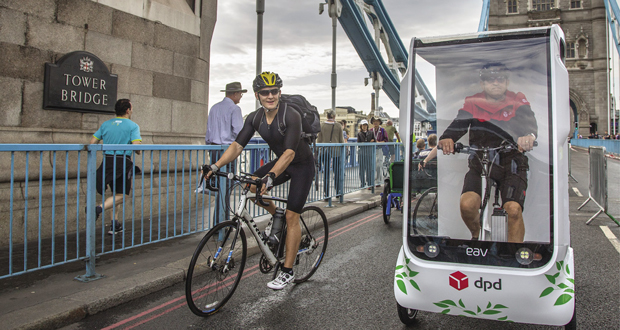SUSTAINABLE DELIVERY
Not everything about using bikes to improve sustainability is in the remit of FMs. But a lot is, including some day-to-day operations. The delivery sector – companies like DPD, FedEx, UPS, DHL Express and City Sprint have all proven that the last mile can be made by a bicycle. They’ve pioneered the use of electric assist cargo bikes to transport upwards of 150kg of goods. Third party cycle logistics firm PedalMe has moved entire offices for organisations. But it is in construction where real progress has been made.
In trials with Crossrail managed by TfL and reported by the Considerate Contractors Scheme, PedalMe ferried loads from a builder’s merchant in Wood Green, North London to deliver to a Crossrail site at Whitechapel. Normally a van doing this would cover 33km – that’s around 330 kilos of CO2 and take about 76 minutes. The bike was half an hour faster. The trial was deemed a success. Other similar examples have been carried out and cycling logistics is becoming a major theme in how major projects move materials. Can this be translated into FM?
Dr David Land at Just Ride the Bike says yes, “The traffic management changes implemented to aid social distancing are fast tracking measures councils have long sought the budget and time to deliver. They are all about restricting the access of vehicles into central business districts. So, if there was a time to consider a different operating model for FM logistics then it is now. E-cargo bikes definitely offer a viable option – but they need to be tested.”
Just Ride the Bike is advocating research to establish a business case for switching all, or part of the white van based mobile service engineers onto bikes.
Simon King, Director of Sustainability and Social Value at Mitie says, “I get the proposition, and e-cargo bikes can play a part in moving to a low or zero carbon FM offer. But there’s a long way to go before we can turn this into reality. The whole operational model needs to be assessed as typically operatives will carry anything from engineering tools to a water bowser.”
That means setting up a hub type operation – not dissimilar to that of last mile delivery companies, but probably more complex. This is where FM operations move into complex fleet management models.
King continues, “The stem, or the route taken from home to the first job, is one obstacle. Then there is the type of vehicle used and the load capacity of the bicycle. Yes, there are varieties of bikes available from two wheeled to four, but there is a lot of research to be done to see what we can do and what the bikes are capable of.”
Right now, Mitie is committed to switching its entire fleet of vehicles from internal combustion engines (ICE) to electric. They have around 5,500 cars and vans and have committed to move to EV by 2025, so that on its own is big carbon reduction. But can a switch to e-cargo bikes go further?
Richard Armitage of the UK Cycle Logistics Federation (UKCLF) says, “We know exactly what e-cargo bikes are capable of. They regularly move loads of up to 250 kilos in London and in major cities such as Amsterdam and Copenhagen. Business Improvement Districts (BIDs) in London have researched the role of e-cargo and bikes and the London Bridge BID hired MP Smarter Travel to run its bikes for business programme – so clients are driving this too.
“With the right contract, the right client, and the right mindset there is every reason to believe that bikes can provide logistical support that’s not just beating ICE and EVs in terms of CO2 emissions and wellbeing but is financially viable too. Right now, and they have a point, FM service providers have to balance consistency of service, sustainability, and ethical goals against what’s commercially feasible. E-cargo bike manufacturers and trade bodies such as UKCLF, the European Cycle Logistics Federation and Cycling Industries Europe are assembling a strong business case for their emerging sector.”
Dr Dave Land agrees: “Cities and major urban spaces of all kinds will make it harder and harder for any organisation to drive vehicles in central areas. That includes electric vehicles. Therefore, to be sustainable every business reliant on a van needs to rethink their business model. So, if FMs want to achieve long term sustainability for themselves and offer it to their clients it makes sense to get on board the bike revolution, now.”
UKCLF – http://ukclf.org/
ECLF – http://eclf.bike/
CIE – https://cyclingindustries.com/
City Changer Cargo Bikes – http://cyclelogistics.eu/
CitySprint – https://www.citysprint.co.uk/





